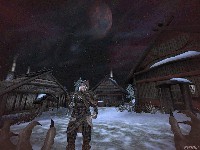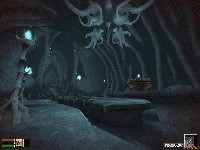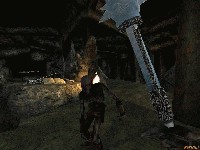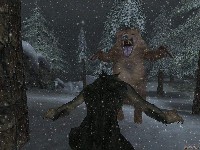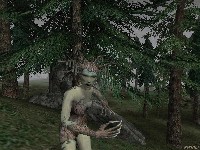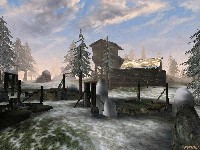|
|
|
Main News Forums Games Games Database Top 100 Release List Support Files Features Reviews Previews Interviews Editorials Diaries Misc Download Gallery Music Screenshots Videos Miscellaneous Staff Members Privacy Statement |
Morrowind: Bloodmoon Review
Just over a year has passed since the release of Bethesda's seminal RPG, Morrowind. That game was followed by a generally well received, but somewhat maligned expansion pack - Tribunal. While Tribunal offered a good amount and variety of gameplay, many Morrowind fans had issues with the geographic limitations, and the more focused storyline. While those are certainly qualities the original game did not feature, and ones that were arguably a welcome change after 100+ hours on Vvardenfell, many fans were hoping for more freedom to explore and more space to do it in. Bethesda apparently listened, as 2003 brings Bloodmoon, with a new landmass northwest of Vvardenfell, and a new style of gameplay, as one of the main features of the newest Morrowind expansion is the opportunity to play as a werewolf. Most gamers knew of the vampire quests in the original game, but where that experience was isolated from the rest of the game, and limiting in what you could accomplish while a vampire, Bloodmoon aims to provide a completely different gameplay experience as a werewolf - one that is integrated both into the main quest of Bloodmoon, and offers new possibilities for the main quest of Morrowind itself.
Setting out for Solstheim Once you install the expansion, you'll find that everyone on Vvardenfell is ready and eager to talk to you about Solstheim - the island on which most of Bloodmoon takes place - even NPC's who have no other dialogue options. This conceit aside, you're informed that a boat in Khuul is waiting to transport you to the snowy wilderness of Solstheim, or you can just start swimming to the Northwest. The island is about 1/5th the size of Vvardenfell, and shares almost none of the same scenery, flora, or fauna. For alchemists, there are new reagents, for explorers, there are new vistas, caves, and tombs, and for everyone, there are new monsters… and plenty of them. Nearly every area on the island is home to a host of hostile creatures - bears and wolves, shirtless Nord Berserkers, goblinlike Ricklings, Spriggans - tree spirits that need to be felled three times before they drop, and many more. Thankfully, the skies and waters are not hostile on Solstheim - there is a new sea creature, but it's passive, except for occasionally when they venture onto land. There are, of course, new weapons and armor as well - though notably, no new options for wearers of heavy armor.
The new island is beautiful, and it's refreshing to see that after a year, Morrowind looks nearly as good as when it was first released. However, this graphical splendor comes at a price - though the system requirements are officially the same, on a lower-end system slow downs are much more pronounced than in the original game, and blizzards can slow the framerate to a crawl. Additionally, many of the desktop crashes I experienced before the original game was patched, and that were nearly non-existent during Tribunal, seem to be back in full force. Also, one of the weakest links in the original game is still with us, in the form of substandard sound - much of the audio is recycled, and as usual, the world sounds hollow, unless you're in the middle of a storm. Considering the whole point of Morrowind is creating an immersive, believable world to adventure in, I find it odd that Bethesda hasn't taken the extra opportunity afforded by two expansion packs to improve the overall audio for the game - especially since one of the first official plugins addressed just that problem.
Questing to a better life But there are plenty of positives. Bloodmoon actually does a great job of combining the best parts of Morrowind with the best parts of Tribunal - the main story is tight, interesting, and focused, but there are plenty of side quests, and lots of new areas to explore. Over the course of the game, you get the distinct feeling that the developers are stretching the limits of the game engine as far as variety and complexity of quests are concerned, but they've done a good job. There are multiple part quests, some of which require you to do a fair amount of thinking, and though there is essentially no fast travel in the game, the smaller landmass of Solstheim is well suited to quests that require travel. There's plenty to see, and numerous caves and caverns to explore, many of which have NPC's with their own side quests. Another thing Bloodmoon has in common with Tribunal is the smaller number of NPC's, and the way that most of them are scripted into one quest or another - which, like in Tribunal, is not really a bad thing, making the world feel more purposeful.
You also have the opportunity to join what is essentially a new faction, with an extensive side quest that offers just as much gameplay (if not more) as the main game, and is arguably just as interesting - the East Empire Trading Company (from Ebonheart) is building a mining colony on Solstheim, and you have the chance to play a large part in its development. One of the real joys of Bloodmoon is seeing a whole town build up around you every time you visit, much like the stronghold quests from the original game. The change to the landscape does a lot for making Solstheim feel immersive and alive. In addition, during many of the quests - both side and main - NPC's will respond to your approach with full speech that reflects whatever service you may be performing for them. It's a small touch, but again, it helps to make the gameworld feel more alive.
Creatures of the night As for the new gameplay element - playing a werewolf - it's a lot like playing a vampire in Morrowind, in that there are significant advantages as well as numerous disadvantages. The game ignores much of the common werewolf folklore for a more practical gaming experience, and one built to fit Bloodmoon. Once you've contracted lycanthropy, you have three days to cure it, or you become a werewolf. Once that's occurred, you turn into a werewolf every night - the moon cycles have no effect on you - and you need to feed every night by killing at least one NPC, or you lose health. Silver weapons do double damage to you, but regular weapons can hurt you as well. Your inventory is inaccessible, and you can't wear armor or use weapons or magic. Of course, the trade-off for this is that you essentially become a killing machine. You can jump much higher, move much faster, and do more damage with just your claws than most weapons. And unlike vampirism, no one will know you're a werewolf unless they see you change form - although at that point everyone in the game will know, presumably by telepathy. However, if you can keep your nature hidden, playing the game as a werewolf presents a formidable challenge, and can be an interesting way to role-play the main game. It's also worth noting that even characters that have finished the main quest of Morrowind and/or are immune to disease will have the opportunity to contract lycanthropy and play as a werewolf, but other than noting that it plays a large part in the main quest with a branching storyline, I don't want to give anything away.
Although Bethesda has stated that any level character can visit Solstheim, I think anyone under level 10 would want to stick close to the fort. The new enemies are formidable, and unlike in Morrowind, they have the tendency to attack in groups. With a high level character, you won't face anything too difficult (especially once you get a weapon from the main quest that can dispatch most werewolves with one hit), but you'll inevitably find yourself resting a lot more than you probably did at the end of the original game. It should also be noted that the functional improvements from Tribunal - map annotations and improved quest journal - are included in Bloodmoon, in case you don't have the first expansion.
Summary All in all, Bloodmoon is an enjoyable, open-ended but well-paced, intelligently designed addition to an already great game, and its refinement of the best parts of both Morrowind and Tribunal may even give gamers that weren't enthused about the original game a good reason to take a second look. The quests are fun, the role-playing options are numerous, and Solstheim offers a brand new wide-open space for players who've seen enough of Vvardenfell. Playing as a werewolf offers the first real addition of gameplay since the original game, and it has been well implemented and well balanced with the rest of the game. As in Tribunal, this expansion is mostly a discrete experience from Morrowind, although bringing your lycanthropy back to Vvardenfell offers an interesting challenge. For anyone that loved Morrowind the first, or fifth, time through, Bloodmoon is a must have, and if you're a fan of RPG's but somehow haven't picked the original game up, the newest addition to the Elder Scrolls should give you another 40-50 open-ended hours worth of reasons to give it a try.
Rate this title and view comments Game Info Printer Friendly Version |
||||||||||||||||||||||||||||||||||||||||||||||||
|
All original content of this site is copyrighted by RPGWatch. Copying or reproducing of any part of this site is strictly prohibited. Taking anything from this site without authorisation will be considered stealing and we'll be forced to visit you and jump on your legs until you give it back. |
||






